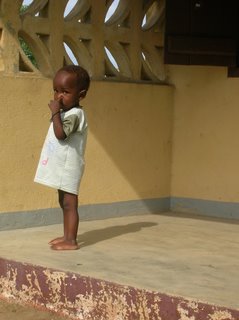Just before England and Portugal kicked off their quarter-final World Cup game today, the streets of Freetown were awash in yellow-and-green clad Brazillian fans gearing up for their team's game against France later tonight. (The English fans, also plentiful here, presumably had already crammed into bars and makeshift theaters around the city.) World Cup fever is perhaps not as intense here as it is in much of the world – I hear Mexico City pretty much shuts down every time there is a game – but it has certainly captivated legions of Salonians over the past few weeks.
My own favorite match thus far was when Italy faced off against USA – an exciting game in its own right, but much more so for the venue and company with which I watched it.
At the time, I was traveling upcountry with one of my supervisors from Washington (Yongmei) and a Sierra Leonean research assistant (Phillip). We were spending the night in Kamalo, a remote village (officially a town, but you’d never guess it) and headquarters of Sanda Loko chiefdom in Bombali district. Sanda Loko, we were told, is one of the poorest chiefdoms in one of the poorest districts in Sierra Leone – but as the guests of the family of a high-ranking government official, we were showered with hospitality. The family even bought us a goat, giving us the choice to either bring it back to Freetown with us or let them slaughter and prepare it for lunch. (We chose the latter).
Incongruously, and thanks to the official’s family, Kamalo boasted a satellite TV “theater” in the center of town: a non-nonsense, rectangular clapboard building, zinc-roofed and windowless (to prevent non-paying peekers), with a chalkboard outside to advertise the feature show. These type of theaters are a common sight around Sierra Leone – dozens of similar but smaller versions pepper the neighborhoods of Freetown and other major towns, each with a chalkboard outside listing the day’s games and the price of admission – but it was not something I’d expected to find at the end of the long, rough dirt road we’d just trekked.
Showing that day were two World Cup games: Ghana vs. Czech Republic at 3 p.m., and USA vs. Italy at 7. We arrived in town too late to watch Ghana’s 2-0 victory, but for the second game, Yongmei offered to pay the admission fee – Le 500, or about 15 cents – for everyone in town, so we could all watch it together.
Thus, a few hours later, we joined a crowd jostling its way inside the theater. The room was large, hot, and dim. At one end was a medium-sized color TV, and facing it were several dozen rows of wooden benches, stretching back in tight formation. A second TV stood some ten feet to the right, with a corresponding seating area, but it was small and the picture was poor, and everyone chose to squeeze in front of the better set.
I took a seat near the front, so it was only at halftime when I turned around and saw the sea of faces behind me – men, women, and children, sitting, standing, and stretching to peer over shoulders and heads – that I realized just how many had crammed into the building. (We were later told the total was around 300). Smaller children clustered at the very front, plopping themselves down on the dirt floor, or clambered onto the laps of relatives or strangers (including me), and a gaggle of latecomers crammed the doorway, blocking any hope of a cooling breeze.
The crowd threw itself into the game, with loyalty split pretty evenly between the two teams. I also embraced the fun: trash-talking with a young Italian supporter to my right and celebrating (or commiserating, as appropriate) with an enthusiastic American fan in front of me. The game itself was an exciting one: two goals, three red cards (a penalty used to throw a player out of the tournament, leaving his team shorthanded for the duration of the game), and much drama in between. At one point, with the game still tied 1-1, the Americans slipped the ball beautifully into the net, and the middle-aged man in front of me – an elected local councilor and probably the most enthusiastic USA supporter in the room – grabbed me in a crushing embrace, bouncing both of us up and down in paroxysms of joy. Only after several minutes did the news filter through his enthusiasm that the goal had been called a no-goal by the referees. He released me in horror and disbelief, and I was really afraid he might start to cry.
The game ended in a draw, and as we spilled out into the darkness after the closing whistle, I joined my fellow USA fans in grumbling about the poor officiating and tough breaks, and commiserating about a game we felt we should have won. But really I was just delighted at the whole experience, and started grinning as soon as I was out of sight.
I'm heading down to a bar on Lumley Beach now to watch the Brazil game with a couple of Tanzanian friends. I'm sure it will be a great game, but I somehow doubt it will match Kamalo in terms of style.












